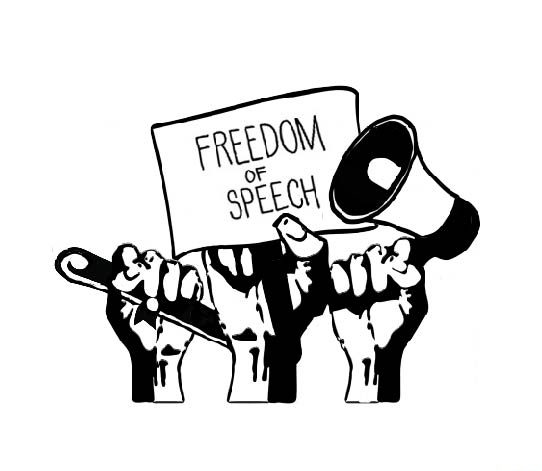Editorial: The U Institutionalizes Student Activism

(Graphic by Emily Christensen | The Daily Utah Chronicle)
February 23, 2022
Student activism has always been a part of the University of Utah’s campus life. We’ve seen protests and demonstrations on small and large scales throughout the U’s history. But over time, activism has been funneled through university-sponsored organizations, which limit the change students can make. U-sanctioned activities silence, rather than uplift, student voices. The U will institutionalize your activism. Reject the institutionalized way to change — instead collect, organize and make real change as students.
We have many examples in our history where students stood together to fight for what’s right. In 1953, U students protested the adoption of a new U constitution by passing around petitions. In 1966, student-led activist organizations protested the U’s textbook prices by blasting music inside the school bookstore. U students demonstrated against the Vietnam War and the violence of the National Guard by occupying the Daily Utah Chronicle offices and disrupting classes. Later on, in 1986, the U student group Students Against Apartheid erected three shanties to protest the U’s investments in South Africa. After the U tried to remove the shanties, the students brought the U to court for infringing on their right to protest.
However, students have found it increasingly difficult to exercise their freedom of speech. The U has formed barriers to silence the student body. For instance, the U established ASUU to encourage students to stand up for their personal ideologies. But ASUU has become an exclusive funnel that keeps many students out and results in little change on a campus-wide level. Other organizations have, and continue to be, destinations for students who want to make a difference within their community, but they often confine students to paperwork and service projects, keeping real change out of reach.
U students care about our community and issues such as student poverty, campus safety and the environment. That passion for making our campus and communities better drives us to join organizations like ASUU, the Bennion Center or the Hinckley Institute.
But some students take their activism beyond the university-governed organizations. They go further despite barriers to student activism and organization. They choose to work towards big changes outside the U’s institutions and complacency. After Lauren McCluskey’s murder, a few U students created UnsafeU, a group dedicated to building a safer campus. In the past few years, U students have also created DivestU, which fights for campus fossil fuel divestment.
Despite the U’s attempt to squander and diminish any forms of activism now, it cannot deny that student individualism is ingrained in our history. True change comes through student-organized demonstrations and protests — not through U-sanctioned organizations.
When we graduate, we’ll still care about the same issues. But we won’t have an ASUU or a Bennion Center to handhold, approve or sign off on our activism. We need to get our hands dirty and become change-makers now, so we learn to engage in activism after the U.
By engaging in activism outside of university institutions, students can make changes bigger than those institutionally approved. We can also build the skills to be activists long into the future. Many anti-war student protestors at the U during the 1950s-70s continued as activists in the Salt Lake Valley into the 1990s. Their college activism taught them how to be activists long after college. We can do the same.
The Daily Utah Chronicle Editorial Board is a group of senior opinion journalists who rely on research and debate to write staff editorials. Editorials represent the majority view of the editorial board and are written separately from the newsroom.








Joe Kuhn • Mar 4, 2022 at 8:27 am
Exactly. The true concerns of students are not reflected in the policies of school, they are redirected to acceptable, non-threatening, forums for easy dismissal. There is no formal policy against activism as it is not necessary when a policy of subversion exists.
The university newspaper is toothless in its present state and as such bears no threat to any kind of power. There is no democratic participation in the system of the university, it’s a common dictatorship just like any business enterprise or corporation.
Expect more dismissal of these degenerative approaches and defensive backlash from those that would rather identify with power than reconsider their obligatory supplication as students, I mean, customers.
John Hedberg • Mar 1, 2022 at 5:09 pm
Doesn’t the publication of this editorial in the university newspaper undercut the whole idea that your rights to free speech are being infringed or suppressed in any way? The fact that student initiatives are able to become “institutionalized” at all seems to indicate that someone is actually willing to listen to you and work with you, and it’s up to you to figure out effective means of using all these tools being offered as part of your extremely wealthy and privileged student experience, rather than reacting like a spoiled infant fuming petulantly for your full diaper to be changed. Democracy is the idea that we don’t need to become lifelong activists to bring about change, you just need to argue specific issues to the point where people are willing to vote for your solution. So, in your next editorial, maybe you’ll present some of your solutions to specific issues, so we can vote on them. Does this idea of “democracy” as a non-violent, rational, pluralistic alternative to a life of red-faced tantrum-marching under simplistic and self-defeating memes make any sense? I know the ancient Greeks thought so. I hear it’s been tried with some success in other places as well, where people decided that rational persuasion to achieve specific policies backed by majority opinion might actually form the basis of a functioning society, as opposed to mobs perpetually protesting unending grievances without any thought or gratitude beyond their own trenchant narcissistic indulgence in pointless and usually baseless accusatory rhetoric.
I can’t wait to hear some of your specific policy solutions in your next article of bitterly suppressed speech.
FYI, it might profit you to read about what happened in Communist China, National Socialist Germany, and Soviet Europe during their supposedly ‘cultural’ revolutions. A life dedicated to grievance seems to lead to millions of good neighbors and family members ending their lives needlessly in tragedy, over and over again throughout the 20th Century. The sociology and politics of “the oppressor” vs “the oppressed” was used to dehumanize whole groups thrown onto cattle cars and into the ovens in every continent where it was tried. It’s being used to carpet bomb innocent neighbors and family members (people) in Ukraine this afternoon. But why should you have to worry about the known genocidal consequences of the life you call for us to follow?
Cheers, With Love & a Grin! 😄🌺
J Hedberg
martine • Mar 2, 2022 at 7:43 pm
where were you wheen the usa was mass killing in Yemen, Sudan, iraq, afghanistan, syria, libya, tunisia
?
Joe Kuhn • Mar 4, 2022 at 8:32 am
When an article is written, or a comment is submitted, it needs to be approved by a moderator. You must have noticed this when you wrote your comment. This factor, by definition, is an example of how free speech is not present.
Martine • Mar 1, 2022 at 7:52 am
You students are under the discipline of left totalitarianism enforced by the officer diversity. That’s a laugh isn’t it?
click here to view the PC enforcement squads that are used to terrorize anyone who will not submit to the left totalitarianism and hatred of white people.
https://diversity.utah.edu/our-team/